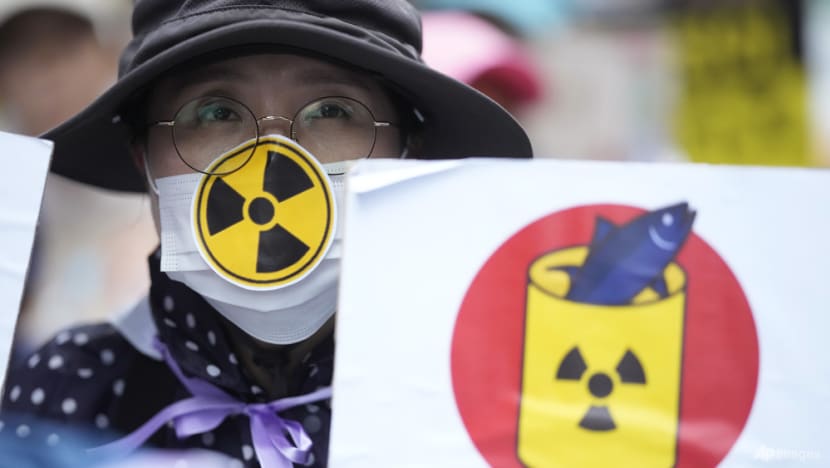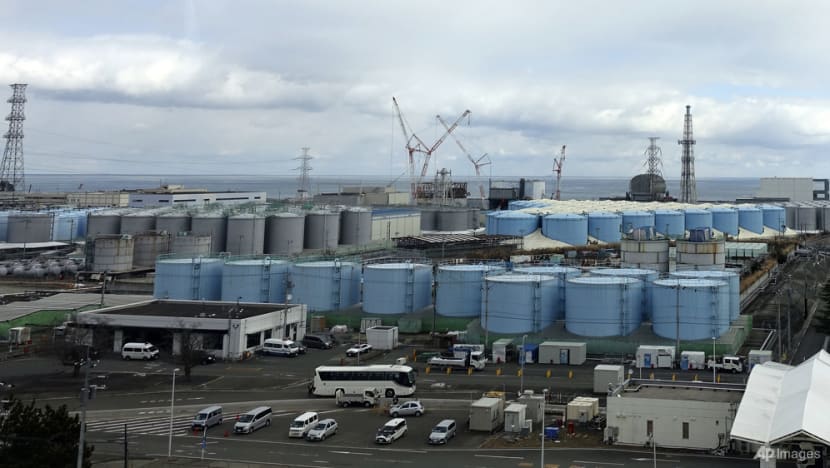Commentary: Is Fukushima wastewater release safe? Depends on your politics and science
Japan’s plan to discharge water from its tsunami-wrecked Fukushima power plant has drawn mixed reactions around the world. Who your friends are is crucial to driving nuclear power policy, says S Rajaratnam School of International Studies’ Alvin Chew.

SINGAPORE: Twelve years after a tsunami hit the eastern coast of Japan and caused a nuclear disaster, the Fukushima Daiichi nuclear power plant is once again at the centre of international concern.
On Tuesday (Aug 22), Prime Minister Fumio Kishida said Japan will start on Thursday the planned discharge of more than 1.2 million tonnes of wastewater - enough to fill more than 500 Olympic-sized swimming pools - from the crippled plant into the Pacific Ocean.
Contrary to the international support Japan received in the immediate aftermath of the March 2011 disaster, the plan has been met with criticism, despite approval by the International Atomic Energy Agency (IAEA).
China has strongly condemned the plan. In July, China and Hong Kong, Japan’s two largest seafood export markets, announced that it will extend its ban on all aquatic products from 10 prefectures in Japan.
While South Korea was initially vociferous, the government formally endorsed Japan’s plan in July after its own assessment. Still, South Koreans have taken to the streets in protest and started hoarding sea salt.
The biggest question on everyone’s minds is: Is it safe? Rational minds may look to the IAEA safety review for reassurance - but science alone is not enough.
SCIENTIFIC ENDORSEMENT ON SAFETY
Certainly, science must undergird the world’s approach to nuclear issues. After nearly two years of work, the United Nations nuclear watchdog greenlit the discharge plan.
In doing so, the IAEA endorsed scientific calculations indicating the treated water will be far below the acceptable radiation threshold. One scientist who advised the IAEA on Fukushima reports described the water released as “a drop in the ocean”, in volume and radioactivity.
The Tokyo Electric Power Company (TEPCO) treats contaminated water using the Advanced Liquid Processing System (ALPS), reported to be effective in removing almost all radioactive substances to acceptable safety levels.
One exception is the tritium isotope, but there is no known technology to separate low concentration of tritium from water as both have similar properties. If there were, Japan would not be dumping it into the sea.
Tritium is a rare but valuable isotope that is crucial for nuclear fusion, the more powerful but still elusive sibling of nuclear fission. In April, Japan adopted its first national strategy on nuclear fusion to develop and commercialise this potential power source.
In addition, the wastewater will be released over the next 30 years to avoid any sudden spike in radiation levels. It will also be discharged 1km off the power plant site via an underwater tunnel and radioactive levels will be further diluted in the ocean.
The wastewater release is also part of the decommissioning process of the destroyed Daiichi nuclear power plant, which is expected to take about 40 years. The water used to douse the melted reactor cores has been treated and stored on site, in more than 1,000 tanks that are expected to reach capacity by early 2024.
Japan also considered an alternative release method, which is evaporating it into the atmosphere, but that option was deemed to be more pollutive as radioactive substances could settle on territorial lands. Japan will not want to store the wastewater indefinitely.
HUMAN FEARS AND ANXIETIES ABOUT ALL THINGS NUCLEAR
Despite the scientific endorsement, very little is known in the public regarding the effects of radiation. Fears and anxieties persist - it is only human.
The concerns are largely on the environmental impact and degradation of marine ecology, as well as the risks to human health.
Tritium emits beta radiation, but this cannot penetrate human skin. The concern lies with the ingestion of affected seafood, which is why outcry within Japan has stemmed mainly from its fishery industry.
As a precaution, Japan has stepped up monitoring of radiation levels in nearby affected waters and will test fishery products before they are released to the consumer market. However, such precautionary measures are not foolproof and people worry that contaminated fish and seafood could arrive on the dining table.
Another contributing factor is TEPCO’s lack of transparency regarding the management of the Fukushima wastewater.
In 2011, prior to the ALPS treatment process introduced in 2013, TEPCO discharged tonnes of untreated, highly radioactive wastewater into the Pacific Ocean, drawing huge criticisms about their irresponsible behaviour. TEPCO had also denied claims of repeated leakages to the groundwater, which led to the flow of radioactive nuclides into the ocean.
Given TEPCO’s disrepute, several experts remained sceptical that the ALPS-treated water was safe and below the acceptable threshold for discharge. As such, TEPCO should first demonstrate the trustworthiness of its organisation before going all out to convince the international community to accept its “science-based” approach.

ABOUT POLITICS AS MUCH AS SCIENCE
While it remains crucial to adopt science-based approaches, the reactions to Japan’s plan show that establishing international support is paramount to drive policies in the realm of nuclear safety and security.
The United States has expressed support for Japan’s water discharge plan, partly due to the fact that all six reactors of the Daiichi plant were designed by General Electric, a US company.
South Korea has also toned down its initial opposition, partially due to its own nuclear experts being allowed to visit Fukushima in May. Similar to Japan, South Korea’s own nuclear plants also adopt US technology, thus possibly landing the US as a playmaker to desensitise the wastewater discharge.
In July, the European Union fully lifted its sanctions on food imports from Japan, a timely measure in support of Japan science-based approach in handling the contamination.
However, China continues to condemn Japan’s plan, repeatedly stressing the importance of obtaining approvals from neighbouring countries before dumping the water into the ocean.
China has called into question the effectiveness of decontamination and the trustworthiness of the data. Notably, the scientific data put forth by Japan indicates that the level of tritium in the treated wastewater is way below the level measured from the annual wastewater discharged by Chinese nuclear facilities.
China’s refusal to acknowledge the negligible effects of the Fukushima treated wastewater highlights the gaps in understanding of long-term radiation effects on human and ecological lifeforms. However, China's unsoftened stance, in spite of scientific data, also suggests that its criticisms have been heavily politicised due to the pervasive deep-rooted tensions between the two countries.
Beijing's opposing stance will only intensify the strategic US-China rivalry in the Asia-Pacific region. This episode demonstrates, especially to newcomer countries, the importance of nuclear partnerships to be forged with a supplying country.
In times of a nuclear crisis, not only does the US render its support for Japan, but it also managed to get international organisations such as the IAEA to endorse Japan’s management of the clean-up process in Fukushima. China should not play devil’s advocate if it intends to vie for a larger share and become a leader in the nuclear sphere.
Dr Alvin Chew is a senior fellow at the S Rajaratnam School of International Studies, Nanyang Technological University.


















